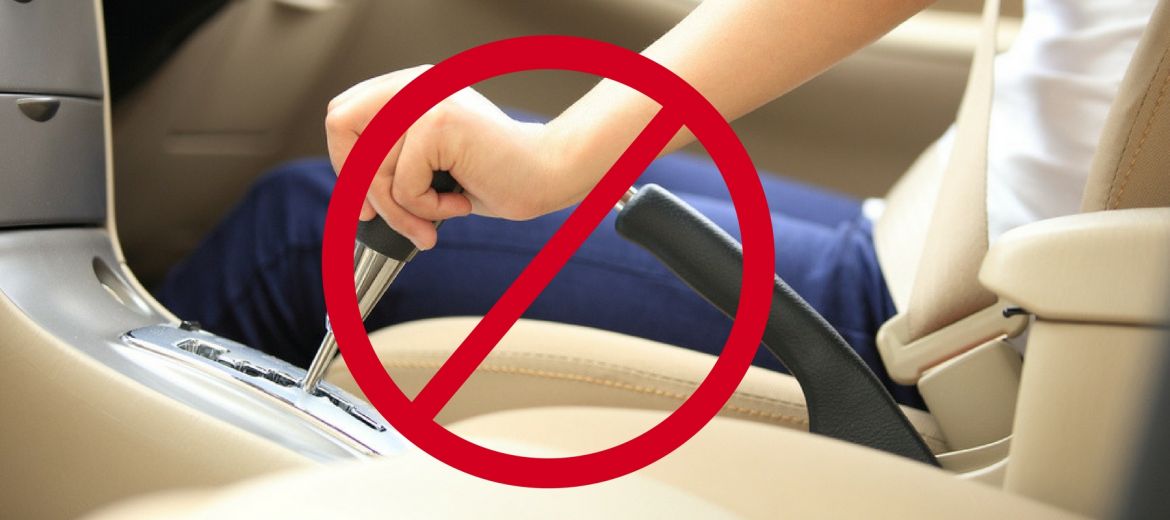10 Bad Driving Habits That Will Damage Your Car in the Long Run

Did you know how you drive or treat your car on a daily basis can make all the difference when it comes to its life span? Continue reading to learn ten bad driving habits that can damage your car in the long run!
Driving on Low Fuel
You may think you are saving time and money by waiting until the fuel tank gets low to refill it, but in fact, the opposite is true. Most car manufacturers and mechanics recommend driving your vehicle on at least a quarter tank of gas.
The reasoning behind this is that when your tank is low, your car is pulling the gas from the bottom of the tank where the sediment from the gas has settled. This greatly increases the amount of sediment that gets transferred to your fuel line and filter. This can cause clogged lines, dirty filter, and sometimes engine trouble if the sediment slips past the filter.
Abrupt Braking and Accelerating
Are you the type of driver that stops suddenly at red lights, stop signs, and behind cars?
If you have a heavy foot and are slamming on the brakes or acceleration, not only are you putting yourself at a higher risk of collision, you are also causing a lot of unnecessary strain and damage to your vehicle. Besides wearing out your brake pads and stressing your engine, you are also shortening the lifespan of your rotors and spending a lot more on fuel than you need to.
Use light touches for acceleration and deceleration. If you step too much on the pedals, you’ll experience that jerking effect, most commonly associated with new drivers. At the same time, you want to avoid riding the brakes for too long. It may feel safer to have your foot on the brakes just in case you need to make a sudden stop, but what you’re actually doing is wearing out the brakes and building up heat, which can do damage to your pads, rotors, and braking capacity.
Reving the Engine
Revving the engine can do damage to your vehicle, but it also depends on the temperature of the engine. If you rev the engine before it has had time to warm up or the outside temperature is low, your car won’t have the necessary lubrication to protect your crucial car parts.
That’s why it’s a good idea to start your vehicle and let it idle for a little bit before stepping on the gas pedal, especially during colder weather. This will give the oil some time to circulate. Otherwise, you could be putting unnecessary wear and tear on your rings, valves, crankshaft, cylinder walls, bearings, and other parts that require lubrication. Those parts are extremely expensive to replace.
Resting Hand on Shifter
If you drive a manual transmission, then you may have developed the bad habit of resting your hand on the shifter while driving. The added weight on the shifter puts pressure on the transmission’s bushings and synchronizers.
Driving with Unnecessary Items
It’s important to have certain emergency items in the car, such as equipment to change your tire, but most drivers are driving around with unnecessary items that add a lot of weight to the vehicle. The more weight that you are carrying around, the harder your car has to work. This means worse handling and fuel economy in addition to unwanted stress on suspensions, brakes, and other important components.
Shifting from Reverse to Drive or Drive to Reverse Before a Complete Stop
Many times, when people are parallel parking, they shift from drive to reverse and vice versa without waiting for the car to come to a complete stop. This is a very bad habit that can cause irreversible damage to your drivetrain.
Ignoring Warning Lights and Other Signs
Pay attention to any strange or unusual sounds and sensations when driving your vehicle. Things like rattling, squeaking, and shaking can indicate a worn out parts or something even more serious. Don’t wait to find out. It’s best to take your car to a mechanic for an inspection so you can catch the problem early on.
Filling Up with the Wrong Fuel
Many drivers have no idea which fuel type they should use. Some assume that the higher priced gasoline is better for their vehicle, while others assume there is no difference and go for the cheapest option instead.
The answer is very simple: consult your owner’s manual
Using the wrong octane rating can do damage to your engine. High compression engines usually require higher octane fuel to reduce “pinging” and “knocking”.
Not Maintaining Fluid Levels and Other Car Maintenance
As a driver, you should know how to check and change your oil and other fluids, in addition to taking care of your tires and other important car maintenance.
If you are a new driver, take a driving course early so you don’t develop any of these bad habits. For seasoned drivers, breaking these habits can be difficult. Try to catch yourself before you make any of these common driver mistakes.